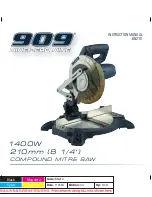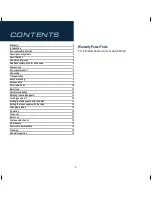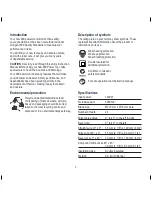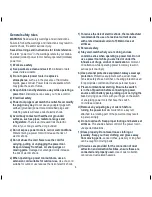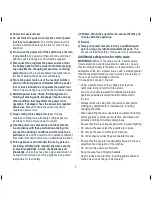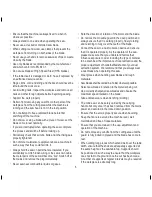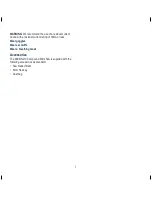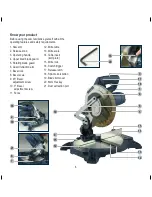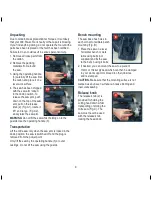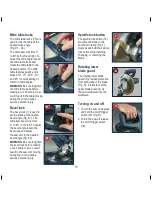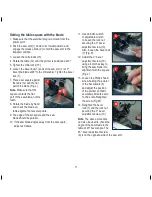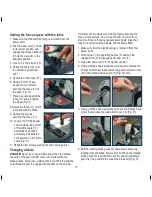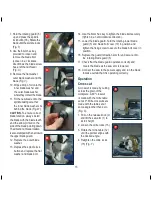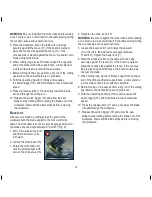
15
Compound mitre cut
A compound mitre cut involves using a mitre angle and a
bevel angle at the same time. It is used in making picture
frames, to cut mouldings, making boxes with sloping sides
and for roof framing. Always make a test cut on a piece of
scrap wood before cutting into the good material (Fig. a).
1. Pull on the release knob (2)
and lift the saw arm to its
full height.
2. Loosen the mitre locks (15).
3. Rotate the mitre table (12)
until the pointer aligns with
the desired angle on the
mitre scale (13).
4. Retighten the mitre locks
(15).
WARNING.
Be sure to tighten the mitre lock before making
a cut. Failure to do so could result in the table moving during
the cut, causing serious personal injury.
5. Loosen the bevel lock (7) and move the saw arm (1) to
the left to the desired bevel angle (between 0º and 45º).
Tighten the bevel lock (7).
6. Place the workpiece flat on the table with one edge
securely against the fence (11). If the board is warped,
place the convex side against the fence. If the concave
side is placed against the fence, the board could break
and jam the blade.
7. When cutting long pieces of timber, support the opposite
end of the timber with the side support bars, a roller stand
or a work surface that is level with the saw table.
8. Before turning on the saw, perform a dry run of the cutting
operation to check that there are no problems.
9. Hold the operating handle (3) and firmly and squeeze the
switch trigger (16). Allow the blade to reach maximum
speed.
10. Press the release latch (17) and slowly lower the blade
into and through the workpiece.
11. Release the switch trigger (16) and allow the saw
blade to stop rotating before raising the blade out of the
workpiece. Wait until the blade stops before removing
the workpiece.
•
With the saw arm (1) in the raised position, use a soft
brush to dust away the sawdust build-up around the
assembly.
Note.
Wear eye protection whilst brushing the dust away.
Maintenance
WARNING.
Always ensure that the tool is switched off and
the plug is removed from the power point before making and
adjustments or maintenance procedures.
Power cord maintenance
If the supply cord needs replacing, the task must be carried
out by the manufacturer, the manufacturer’s agent, or an
authorised service centre in order to avoid a safety hazard.
Cleaning
1. Keep the tool’s air vents unclogged and clean at
all times.
2. Remove dust and dirt regularly.
Cleaning is best done with a soft brush or a rag.
3. Re-lubricate all moving parts at regular intervals.
4. Never use caustic agents to clean plastic parts.
CAUTION.
Do not use cleaning agents to clean the
plastic parts of the saw. A mild detergent on a damp
cloth is recommended.
General inspection
Regularly check that all the fixing screws are tight.
They may vibrate loose over time.
a
Содержание BN210
Страница 16: ...16 ...

